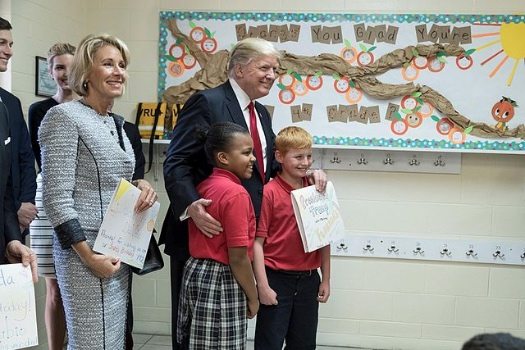
June 13, 2017; Chalkbeat
Above all else, the Trump administration’s educational platform believes the key to a great public school system is “choice.” In a recent speech to the National Alliance for Public Charter Schools, Education Secretary Betsy DeVos said, “A system that denies parents the freedom to choose the education that best suits their children’s individual and unique needs denies them a basic human right. It is un-American, and it is fundamentally unjust.” From their perspective, the choice menu must be large, and the arbiter for effectiveness should be parents and not government.
Their strong advocacy has changed the reform debate. During the Obama years, disagreements arose about the effectiveness and impact of publicly funded but privately managed charter schools. Were they more or less effective than traditional public schools? Were they siphoning off resources needed by traditional public schools while being selective in whom they were accepting as students? The election of Donald Trump has opened a more complex debate about the future of public education.
Despite a lack of clear evidence that there is a strong difference between nonprofit and for-profit charter schools, a major division has emerged, pitting one type of charter against another. Shaver Jeffries, President of Democrats for Education Reform, told Chalkbeat “We don’t know how people can figure out how to educate kids and then distribute profits to investors. Furthermore, we haven’t seen the track record of people able to do that.” Marshall Tuck, who is running to become California’s Superintendent of Education, made this opposition even clearer in an article he wrote for L.A. School Report: “Educators—whether at district or charter public schools—can agree: public schools must serve students, not shareholders. Profit has no place in our public schools.”
Supporters of for-profit schools, led by Secretary DeVos, see the goal of reform as giving more power to parents and less to government. Kevin Chavous of the American Federation for Children captured this position when he said, “I’m from the Malcolm X school—by any means necessary…I don’t rule out any learning modality that can help a kid.”
Sign up for our free newsletters
Subscribe to NPQ's newsletters to have our top stories delivered directly to your inbox.
By signing up, you agree to our privacy policy and terms of use, and to receive messages from NPQ and our partners.
Jeff Henig, a Columbia University professor, sees this rift in terms of a larger political context.
What may account for why this is becoming more publicly talked about is this re-opening what was always a strange-bedfellow coalition. That cleavage is widening now, with the for-profits seeing a chance under Trump and DeVos to jump back ahead in the game and the nonprofit, progressive group worrying that they’ll be tarred by the bad-apple stories…. Those folks for many years traveled together because their main battle was against the unions and traditional public schools, and the stickiness of the status quo.
While charter school advocates continue this internal debate, they are also increasingly concerned about the administration’s support of voucher programs that allow parents to channel public funds (or receive tax credits) while their children attend private schools. Critics see the lack of public visibility and accountability when public monies go to private organizations as a major flaw in voucher programs. They also cite church-state issues if vouchers can be used at religious schools, and they see the shifting of limited public education funds to non-public schools as further weakening the economic foundation of public schools.
Those who see vouchers as just another element of the education menu presented to parents place choice above all other values. The act of choosing the education they believe is best for their children will lead to stronger results. Secretary DeVos captured this philosophy when she said, “Our focus should be on not choice for choice’s sake, but choice because parents are demanding something different for their children. For every year that they don’t have that opportunity, their child is missing out.”
The president and his Secretary of Education have shifted the debate. No longer are we being asked to focus on the best way to teach all of our children. Rather, the very role of education as a reflection of our shared sense of community and nation is on the table. From the administration’s perspective, government has no role in setting the content or effectiveness of education. That responsibility is best done by each parent. Even issues of equity are subservient to individual choice. We are being asked if we want to reform public education to a system that has no common set of values and in which government does not serve as the protector of individual rights and common futures. This will be a more important outcome of legislative debates over the president’s education agenda than just the amount of money that is being allocated.—Martin Levine













